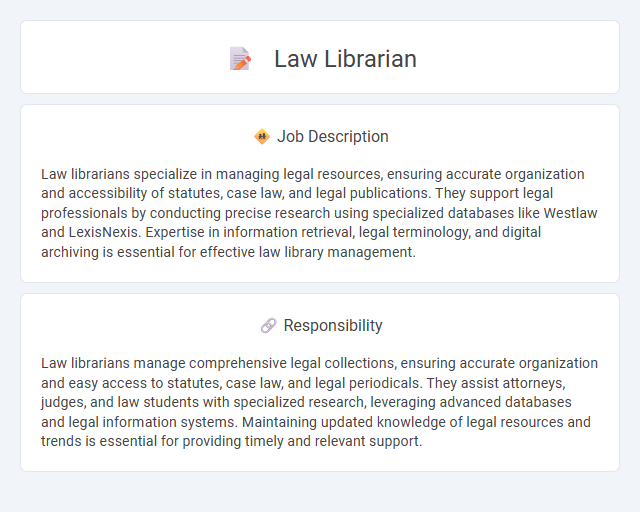
Law librarians specialize in managing legal resources, ensuring accurate organization and accessibility of statutes, case law, and legal publications. They support legal professionals by conducting precise research using specialized databases like Westlaw and LexisNexis. Expertise in information retrieval, legal terminology, and digital archiving is essential for effective law library management.
Individuals with strong research skills and a passion for legal information management are likely to thrive as law librarians. The job may suit those who enjoy organizing complex data, working in quiet environments, and assisting law professionals in finding precise legal resources. Candidates who prefer dynamic social interactions or fast-paced settings might find the role less compatible with their preferences.
Qualification
A law librarian typically requires a Master of Library Science (MLS) or Master of Library and Information Science (MLIS) degree, often supplemented with specialized knowledge in legal research and law. Experience with legal databases such as Westlaw, LexisNexis, and HeinOnline is essential for efficiently supporting legal professionals. Strong organizational skills and familiarity with legal terminology enhance the ability to manage and curate legal information resources effectively.
Responsibility
Law librarians manage comprehensive legal collections, ensuring accurate organization and easy access to statutes, case law, and legal periodicals. They assist attorneys, judges, and law students with specialized research, leveraging advanced databases and legal information systems. Maintaining updated knowledge of legal resources and trends is essential for providing timely and relevant support.
Benefit
A Law librarian is likely to benefit from access to a specialized collection of legal resources and databases, enhancing research efficiency and accuracy. The role probably offers opportunities to collaborate with legal professionals, fostering a deeper understanding of law and increasing career advancement potential. Job stability and a structured work environment are also common advantages in this field.
Challenge
The role of a law librarian likely involves navigating the challenge of managing vast amounts of complex legal information efficiently. They probably face the difficulty of staying updated with constantly evolving laws and legal precedents while ensuring accurate and timely retrieval for users. It is probable that balancing traditional research methods with emerging digital tools presents ongoing challenges in this profession.
Career Advancement
Law librarians can advance their careers by acquiring specialized knowledge in legal research databases like Westlaw and LexisNexis, and pursuing certifications such as the Academy of Health Information Professionals (AHIP) or the Special Libraries Association (SLA) credential. Gaining expertise in information technology and legal analytics enhances opportunities for leadership roles, including senior librarian, research director, or law firm information officer. Networking within legal and library associations fosters mentorship and opens pathways to academic, corporate, or government positions with increased responsibility and higher salary prospects.
 kuljobs.com
kuljobs.com